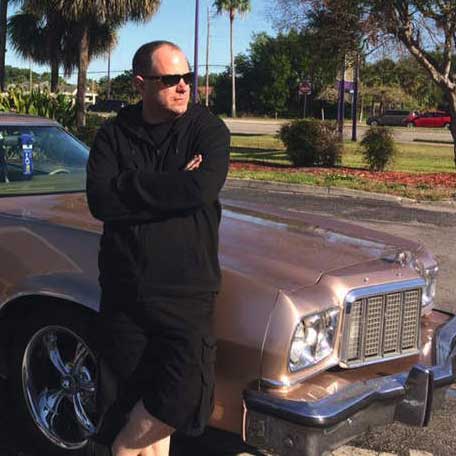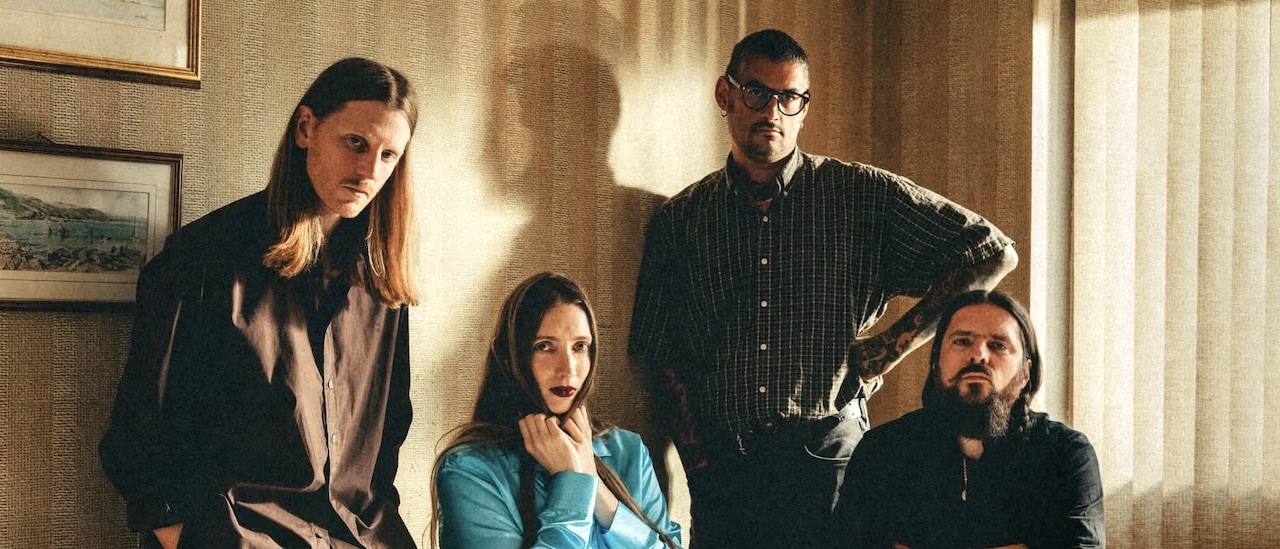How The Offspring Became One Of The Biggest Punk Bands In The World
In this 2001 interview, Dexter and Noodles reflect on years of touring, getting stabbed, playing gigs in caves and sleeping in drug dens
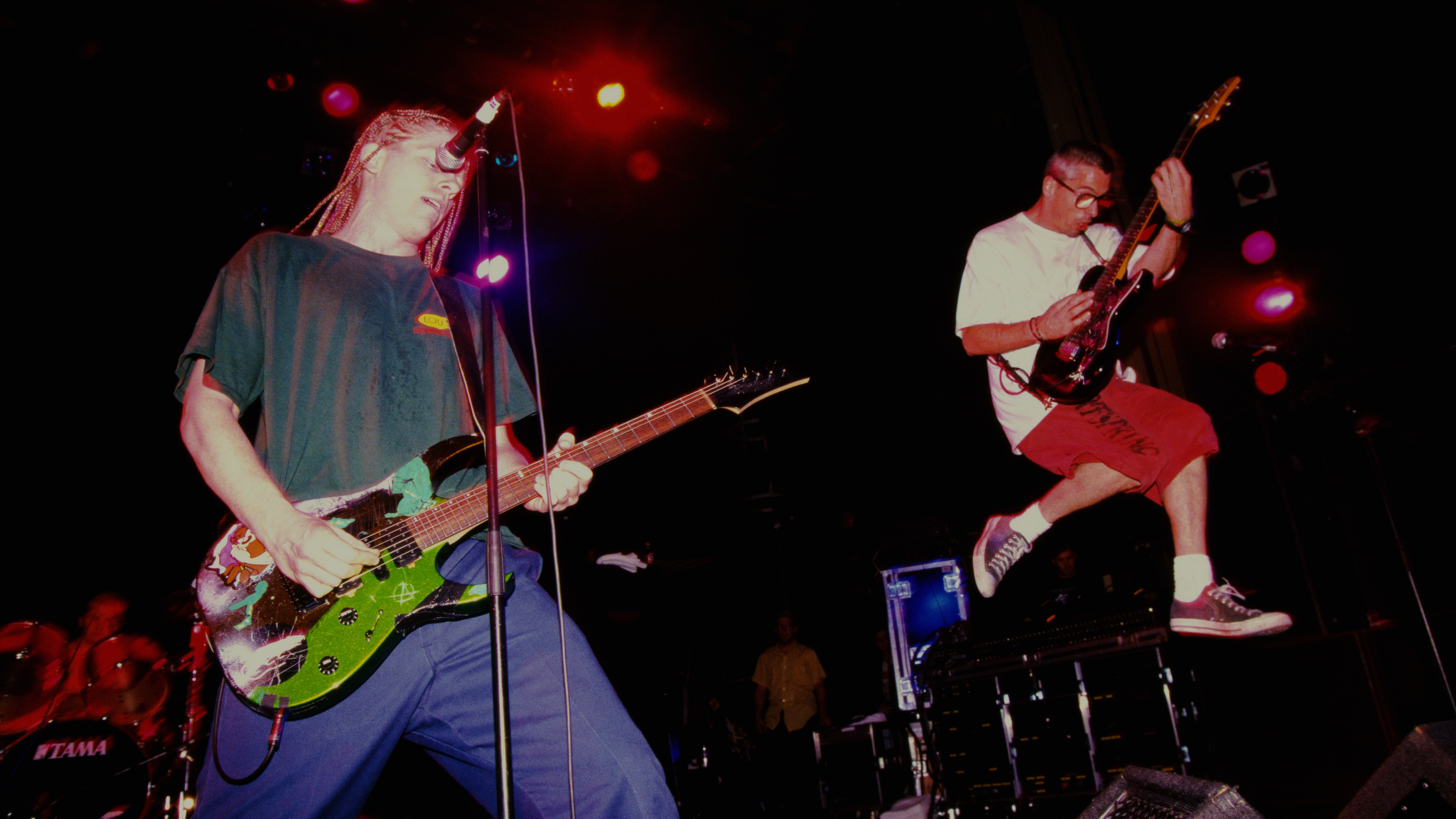
It’s the summer of 1993 and I’m congratulating Dexter Holland, the fresh-faced and braided-hair singer with The Offspring. He’s just stepped off stage after playing a blinding set – consisting of pretty much the entire Ignition album – in Newport’s TJs. “Hey thanks man,” says Dexter, grinning all over. “I didn’t think anyone here would have known us…” The Offspring played that toilet circuit of the UK just once. The next time they came back, their third album, Smash, had gone nuclear.
Fast forward to this year’s Conspiracy Of One world tour and they’re playing their biggest ever show to 15,000 in Paris. Americana sales wordwide have reached over 12 million, while Smash is pushing the 13 million mark. The Offspring are officially the biggest punk band. Ever.
But let’s go back. Way back. How did it all start? “I’d known Dexter for some time because he lived round the corner from us,” says guitarist Noodles, known to his mum as Kevin Wasserman. Singer/guitarist Dexter Holland, bassist Greg Kriesel and Noodles all grew up in Garden Grove – a conservative town with the world’s first drive-in church – in south-east LA’s Orange County – a suburb renowned for both Disneyland and as a bastion of right-wing politics. The ideal place to start a punk band, then.
Sticksman Ron Welty came from a bit further down the road in Cyprus. Ron replaced original drummer James Lilja – the ‘Pete Best’ of The Offspring – who was more interested in staying in UCLA and going to parties with his fraternity chums than wasting time jamming with some two-bit punk band who were going nowhere fast… doh!
In the mid-80s, Noodles started his own band called Clowns of Death. Dexter joined for a while but then started up his own band with school friend Greg (that Noodles later joined) called the Manic Subsidals, after seeing Orange County punk legends Social Distortion live. Being three years older than Dexter and Greg, it’s rumoured Noodles was enlisted for his ability to procure alcohol, rather than his guitar skills.
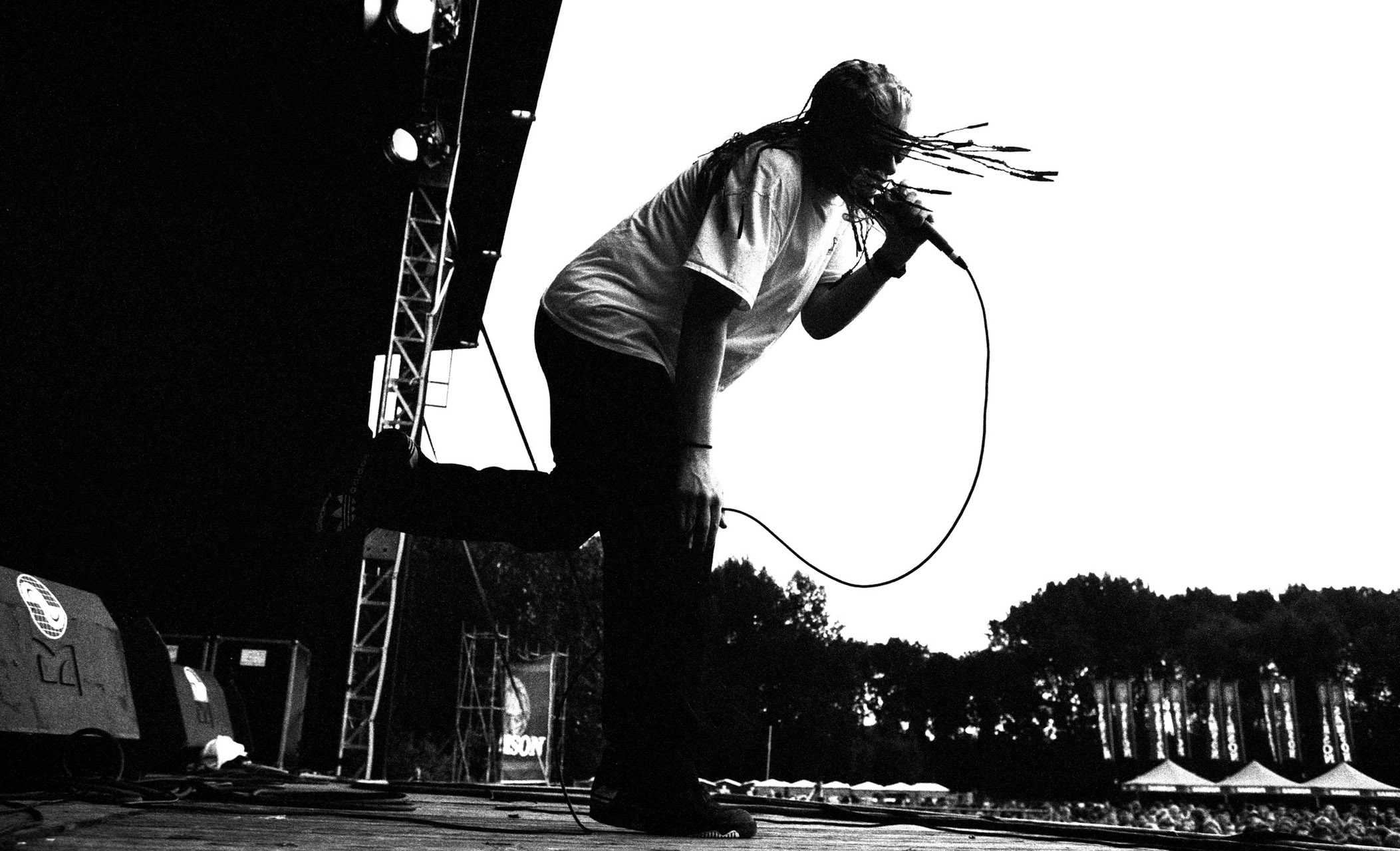
Plagued by their awful moniker, they decided it was time for a change. “It was just a horrible name,” says Noodles, who was working as a school janitor at the time –a job he continued until sales of Smash took off. “The Offspring was the only name everyone could agree on,” he tells us. “I think it was actually James our original drummer who came up with it.”
Ron Welty joined in 1986, just after The Offspring recorded their first self-financed seven inch I’ll Be Waiting. Influences that shaped their early sound were wide-ranging. “I was listening to bands like Ramones and The Clash,” says Noodles. “They showed me I didn’t have to be Jimi Hendrix or Eddie Van Halen to play the guitar. I just started jamming with friends; taking guitars down the park and having a few beers.”
The latest news, features and interviews direct to your inbox, from the global home of alternative music.
Dexter was a punk fan from the word go. “There was something about the punk bands when I was a kid that inspired me, rather than wanting to be in a band,” he says. “Bands like Ramones and Dead Kennedys. I think it was more the idea that these bands put forward: anyone can do it. It was music that really related to average kids and music that the average kid could do.”
It was that DIY spirit that kicked off the entire SoCal – not to mention the US – punk scene. Dexter: “Jello Biafra from Dead Kennedys once said that after Ramones did this one US tour in 1978, almost every town they played in, all of a sudden, five new bands sprung up.”
So what was the Orange County punk scene like when Offspring were starting out in the mid-late 80s? “It was kind of in a lull,” says Dexter. “It was a really exciting time about four years before we started. There were a lot of great bands like Social Distortion, TSOL and The Adolescents that sprung up in the early 80s but that whole scene died out.”
That lack of a real scene in their hometown had other consequences for the band. Dexter: “When we started out there weren’t really places to have concerts and there wasn’t too much of a scene happening like there was in San Francisco. But that just made us look elsewhere. So we started playing more shows further afield.
“We used to do shows out in the desert. There was this guy in Las Vegas who used to put on shows but he couldn’t find a venue. So he’d rent out generators then pass out flyers, and he would go about 50 miles out into the desert and just set up and have concerts. It was amazing.
“We once played a show at a house that was going to be demolished. This guy goes, ‘come and do a show here, we can just mess up the house!’ So we played the show and the people there destroyed the house!”
“One of the bands we played with the most was Guttermouth,” says Noodles of the Huntington Beach urchins, who Dexter would later sign to his own label, Nitro. “We’d take turns in who would headline the show. We played with Agnostic Front one time in San Bernardino. We played with DI and TSOL on their reunion tour in 1989.”

Now that The Offspring are travelling the world in buses and staying at fancy-schmancy hotels, they remember the early days with fond nostalgia. I remind Noodles of the time when The Offspring played at a mutual friend’s house up on Palos Verdes Peninsula – a middle class suburb between LA’s South Bay and Orange Country – in 1990. Held on St Patrick’s weekend with green-coloured beer provided by the teenage promoter (and held in his parent’s house), the bill went like this: Citizen Fish/Cringer/ Neurosis/Offspring.
“I remember that show!” he laughs. “That was a crazy weekend. We went from that show to playing in Santa Monica with Youth Brigade. We did four gigs in one weekend! We did Gilman Street [legendary San Francisco punk venue] on Friday night, then we played a barn in Santa Barbara on the Saturday afternoon. Before the gig in Palos Verdes on the Sunday,” says Noodles with amazing memory on the highlights of pegging it around Southern California in the early days.
“That was the whole nature of it – going by the seat of your pants and just rolling with it,” reflects Dexter. “That what made it so much fun – it was an adventure. You never knew where you were gonna play or who you were gonna play for.”
Like so many other bands, The Offspring took the DIY ethic out onto the road within their first US tour. “We did it in the back of my pick-up truck,” says Dexter. “I had this 1979 Toyota pick-up. Really beat-up. Didn’t run very well. It had this grandpa fisherman camper shell on the back of it. So we put all of us – and one roadie – plus all our equipment in the back of this truck. We did a tour all the way across the country from LA across to the east coast and back for three and a half weeks.”
With one cramped pick-up to sleep in, the guys would take desperate measures to get a good night’s sleep. “Usually we would beg on stage and ask ‘is there anybody here who can put us up tonight?” laughs Dexter. “And usually people were really nice so we’d get to sleep on people’s floors.”
“Once when we were playing in Berkeley we drank beers til we passed out in the van, which was parked by a school,” adds Noodles. “The cops would come along in the morning and wake us up.”
Making it all the way to the east coast, the band plays venues in the backass of nowhere – with some scary results. “There was this one place we played in North Carolina that was just like a pool hall,” says Dexter. “The promoter guy said we could stay there so we slept on the pool tables. The whole place was a bit shady because at about five in the morning the guy would be up and blaring the jukebox. People would be coming in and out all night. I think he was dealing drugs in the back at the same time.”
It wasn’t all fun on the road. Being a relatively unknown band and playing in unlicensed venues like so many punk venues in the States, there’s always an element of danger to proceedings. “People would be crammed into tiny spaces with no fire escapes and one small door,” says Dexter. “Then the police would turn up to break up the shows, making it even more dangerous as people start to panic.
“Once we played this show in Prague, Czechoslovakia,” he says. “We played this underground club that was down four flights of stairs into the ground then it opens up into this cave that holds 400 people and the only way out is that one tiny staircase that goes all the way up. And we’re playing at the very back and you know that if anything happens that it’s all over and there’s no way you’re gonna get out.”
“Once Noodles was stabbed at a show in the early 90s,” Dexter reveals. We were playing a show with Final Conflict [hardcore LA anarcho-punks]. Some skinheads turned up to mess up their show – we were playing right before them. They tried to break in and the people on the door put up a table as a barricade that the skinheads were trying to get over. Noodles, being the pacifist he is, tried to get in between and mellow everything out. This skinhead jumped over the table and punched him in the arm. Noodles was like, ‘God, that really hurt – for a punch!’ Then he looked down and his jacket was covered in blood and it turned out that the guy had punched him with a knife in between the knuckles.”
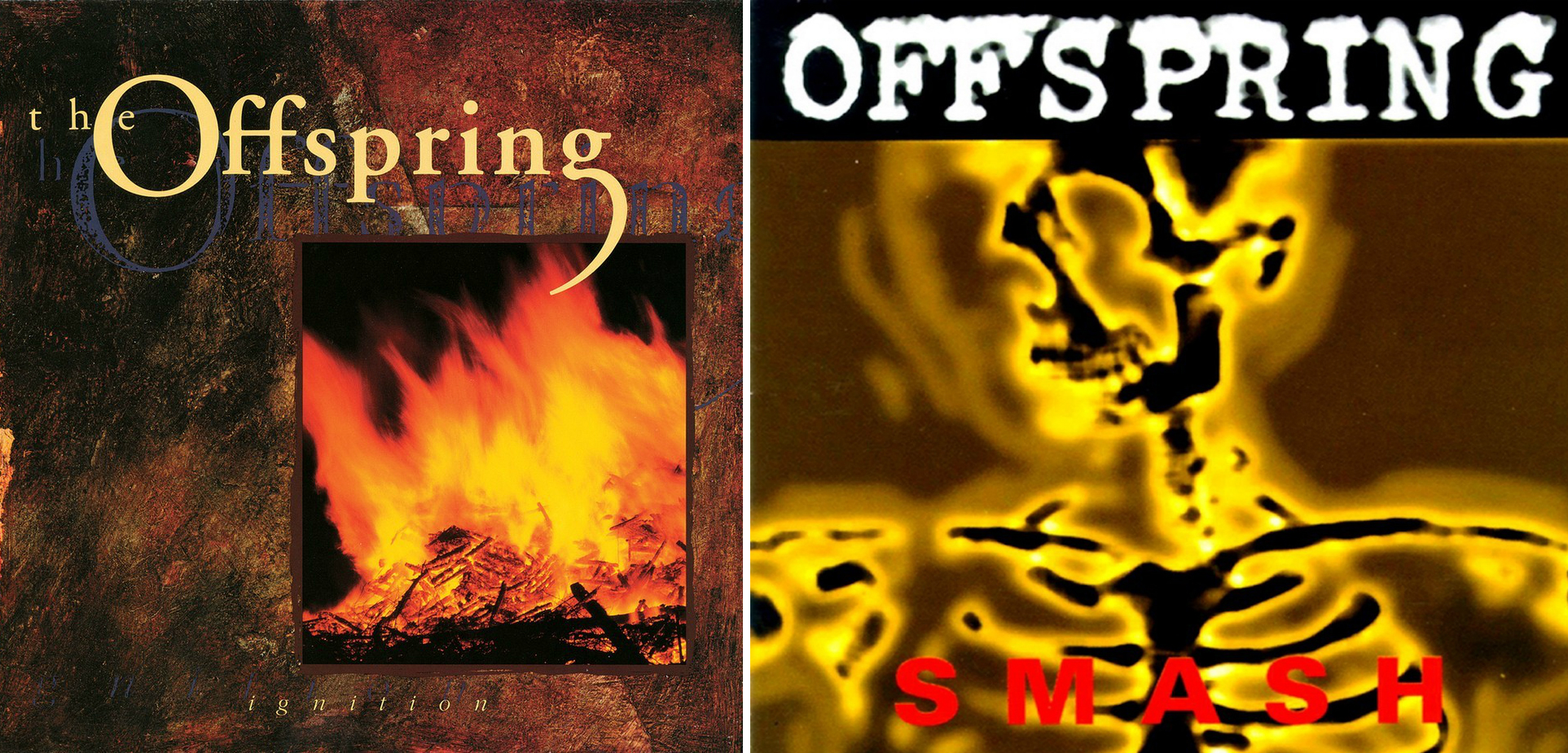
After their second album, Ignition, in 1992, The Offspring took off on that first European tour. To their surprise, they realised they’d created an equally big fanbase outside of the US as well as at home. But again, the sleeping arrangements weren’t ideal. “We slept on NOFX’s bus and really messed it up,” laughs Noodles. “There only enough bunks for three of us,” says Dexter. “So we had to take turns sleeping on the floor in the aisle every night. But it was a great tour: 31 shows in 35 days across Europe. Those trips were tough to manage and gruelling. We did five shows in the UK that went really well. That made us really fond of the UK ‘cos we always have a great shows and a good time there,” says Dexter, ever the diplomat.
The year later, Smash was unleashed on a nation of unsuspecting music fans, still groggy from the stale and wheezing gasp of the decrepit grunge era. The release date of The Offspring’s third album was April 8, 1994. The very same day Kurt Cobain’s body was discovered and he was pronounced dead from a self-inflicted gunshot wound.
Grunge was officially dead and disaffection had a new soundtrack. This time it wasn’t a pessimistic dirge, but sunny, uplifting Californian power pop-punk. Bored by the media circus of Britpop, UK kids snapped up Smash as well. Worldwide sales quickly reached 11 million. The Offspring had arrived.
It was a shock to the system for The Offspring with the obvious benefits – but downsides too. “We were on tour with Smash back in 1994’,” says Noodles, trying to pinpoint a time when they realised they were hitting the big time. “We were drinking beer outside. We got a call from Epitaph and they told us that Smash had just gone platinum [one million US sales]. It was a weird feeling. I guess it was good, but it’s a life-changing thing.”
“We were on tour in Europe and they sent us a rough cut of the video for Self Esteem,” says Dexter. “It just looked it was gonna work. Even the guy who was doing the t-shirt stall for us was like, ‘you guys are gonna be stars!’ There was something about that moment when it felt like things were starting to go.
“It was exciting – but scary at the same time. When you’re struggling, it’s actually kinda nice not to be noticed in a lot of ways. As things accelerate, in a lot ways it’s great -– don’t get me wrong, I’m not complaining – but there’s an increase in bad attention as well. Things are looked at a lot more critically. You have a lot of people in other bands who hate you because they don’t like the music or they’re jealous.”
Success certainly has it downsides and that was the tour when Noodles starting drinking to excess. “Way more than anybody,” as he puts it. Especially when he found out that his girlfriend back home was cheating on him while he was out on the road. “But then we played some great shows,” says Noodles, looking on the bright side, as ever. “The audiences were wild.”
“You have to develop a thick skin,” says Dexter. “If I see that there’s a review of an Offspring record inside a magazine, I won’t even read it. Even if it’s good, I won’t read it because of the nature of critical writing is that there’s always gonna be a jab in there.
“Also, you lose a certain amount of your privacy. I was driving home from somewhere two days ago. I pulled into the parking lot of a liquor store on the way home and a car pulled up next to me. As I was walking into the store, I hear ‘excuse me!’ It was a mom and her 10-year-old son. She goes, ‘my son recognised you in the car so we followed you until you stopped, can we have your autograph?’. It was amazing that these people fucking followed me!”
So, with the success of Smash, did The Offspring make Epitaph big, or vice-versa? “I think it’s a little bit of both,” says Noodles defensively. “You’re opening up a can of worms there.” The Offspring’s signing to the Sony-owned Columbia may have sacrificed friends at Epitaph Records HQ – not to mention in the underground scene. But Noodles maintains they were already under criticism from the punk police when they were still on Epitaph.
Epitaph subsequently became so successful that it’s grown to such proportions that it now has subsidiaries of its own – like Rancid’s Hellcat Records. Fanzines and underground punk mags like MaximumRockNRoll – the holy bible of the US punk scene – stopped taking ads from Epitaph as they were no longer considered an underground punk label.
Unbelievably, people would picket Offspring’s gigs, even when they were touring for Smash. “We’d go out and talk to these kids,” says Noodles. “We’d say ‘what do you guys think of bands like TSOL? Crass?’ They hadn’t even heard of them.
“We had a friend who worked at a record store,” he says. “Kids would come in and buy like Smash or Dookie, then a week later they’d come in and buy Operation Ivy and Bad Religion. Then the next week they’re coming in and getting Crass or Conflict. Then our friend would go, ‘I remember the first time you came in here and bought Offspring and Green Day’. And they’d be like, ‘ah, Offspring and Green Day suck!’ But then it’s bands like us and Green Day who sparked their original interest in the scene.”
But has that scene peaked? Has it burnt itself out over the past 10 years? “I think there’s way more punk bands still playing today than there ever was,” says Noodles. “I think the scene’s really solid because of what’s going on in the mainstream. It all reminds me of what was going on in Gilman Street 10 years ago.
“But those bands like Pennywise and Guttermouth – they’re doing well. I love those bands. They’re some of my favourite bands today. I think it’s good that there’s competition. And we all know we’re the better band anyway,” jokes Noodles.
All the same, isn’t it strange that the Offspring have got huge when bands like Guttermouth and Pennywise – both who have been playing for as long – are still relatively unknown by comparison? “I think it’s stranger that bands like Ramones never got the amount of attention that we have,” says Noodles of his punk rock idols, speaking shortly before the tragic death of Joey Ramone. “Iggy Pop as well – he never got the attention we had.”
That amount of attention came to a head when The Offspring were once scheduled to play with Ramones in Europe – following them on stage. “We weren’t comfortable with that,” says Noodles. “They’re huge, they’re legendary – they should be on after us, headlining the show.”
After a chat with Joey and the boys, who maintained that The Offspring were huge and the skinny leather-clad punkers didn’t want to go on after, the Offspring relented. “They were really cool about it,” remembers Noodles. “They’re such a great band.”
Before long, the task of following up Smash came about. No mean feat, as Dexter recalls. “Everyone was saying ‘look out for the sophomore slump’ so you’re half expecting it,” he says of the band’s fourth album and Columbia debut, Ixnay On The Hombre. “The other thing is, you can’t really expect another record to sell as Smash does because that’s a once-in-a-lifetime thing.”
“How many musicians get to have a record as do as well as Smash? Not many,” adds Noodles. “So we counted ourselves lucky to have something that’s done as well as that one record. We still got to go out and tour for 15 months off the back of it,” he says. “Let’s see, Ixnay? Only did, around, three million? No good, right?” jokes Noodles, taking a pop at the critics who lambasted Ixnay when it came out for not living up to their high expectations of Smash. “But we redeemed ourselves in the eyes of the record labels with Americana,” says Noodles.
“Luckily for us it was twice in a lifetime thing because Americana did really well,” says Dexter. We also knew that in order to have a life after Smash, we couldn’t just repeat what was on it, we had to expand the horizons of the band. I wasn’t terribly surprised.
“For the real fans, it’s inversely proportional. The worse a record does, that’s the one that the diehard fans like the most. People come up to me all the time and say ‘I hate your most popular song but I like the ones that only me and my friends know about!’”
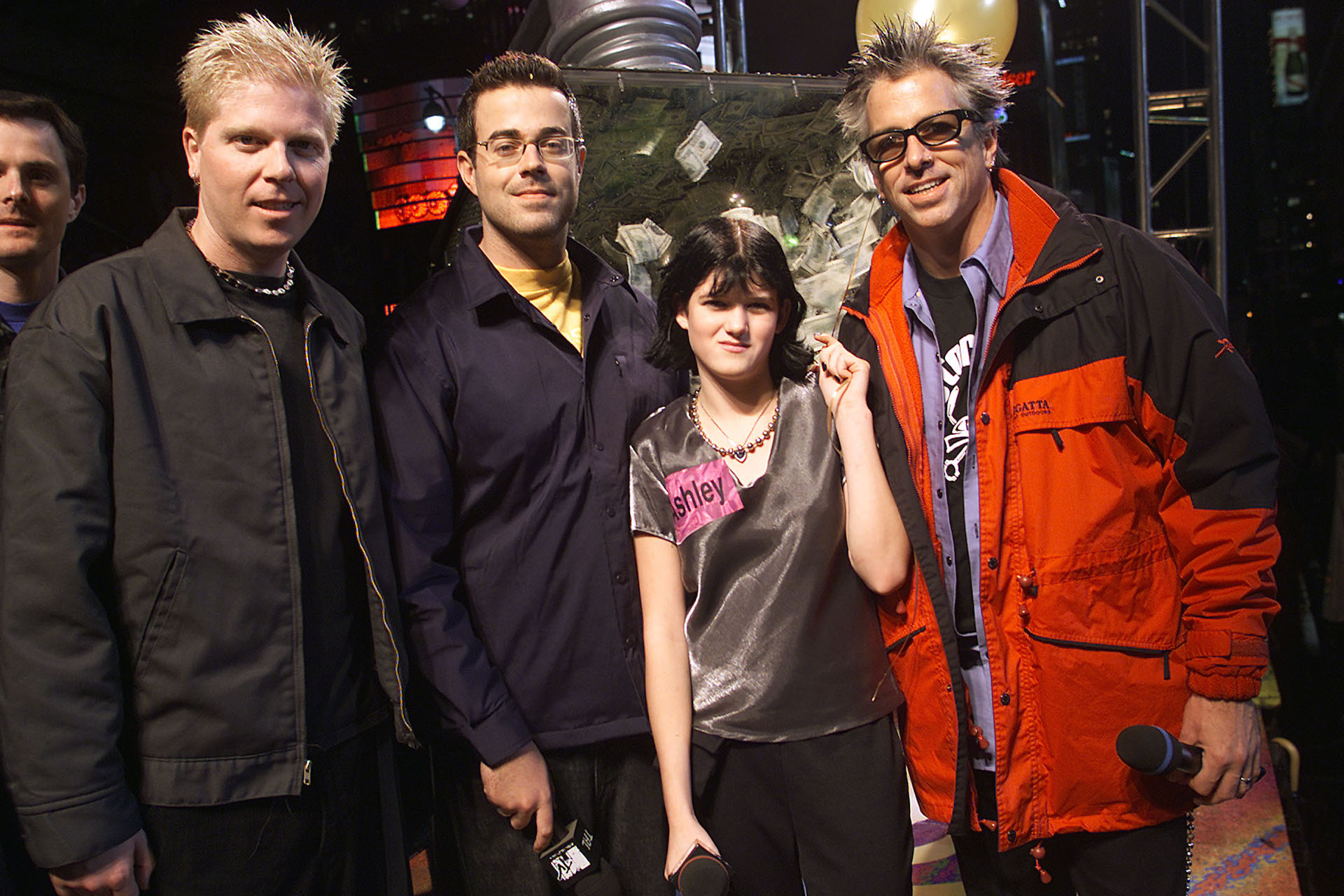
With the release of Conspiracy Of One, The Offspring pulled something even more special out of the bag by giving away $1 million of their own cash as a promotion. Everyone who downloaded the single Original Prankster from their website was entered into the prize draw.
“We wanted to give away something of our own to celebrate having the new record out and give something back to the fans,” says Noodles. “I thought giving away a million dollars would fuck that kid up! The winner was a 14-year-old girl from Atlanta. We weren’t even her favourite band!” he shouts. “We were her second favourite band and Slipknot were her favourite! And she’s gone! Nobody knows what’s actually happened to her. Maybe she’s run away with Slipknot…”
So what’s next? The Offspring still have one album left to fulfill their contract with Columbia. But what’ll happen after that? After all, they’ve all got families and let’s face it, they’re not the spring chickens they once were… “I can’t see us not getting together and making music,” says Noodles. “I know Dexter is the same. Not sure about Greg…” says Noodles, on the wind-up again. “No, Greg just gets tired of touring, but he’s still into it. We’ve all known each other since childhood and we all get one really well.”
The Offspring all still live in their native South LA homestead of Orange County. But in way bigger houses than you used to, right? “Yeah,” admits Noodles, laughing. “But none of us live in mansions or gated communities or anything like that.”
Seems like The Offspring have mellowed somewhat though. Especially since when they’d write political and social comments on their self-titled debut and Ignition like Kill The President and LAPD. Are The Offspring still angry or have they been swallowed by the Orange County conservatism they were originally kicking against?
“I don’t think we have,” says Noodles. “I still love that first record. And I love the fact that we still have a president that I hate.”
This feature was taken from Metal Hammer issue 88 in 2001.
The Offspring are on tour now. They play three UK dates with Bad Religion from June 19.
10 Cali punk albums that paved the way for The Offspring's Smash
A regular contributor to Louder/Classic Rock and The Quietus, Burrows began his career in 1979 with a joke published in Whizzer & Chips. In the early 1990s he self-published a punk/comics zine, then later worked for Cycling Plus, Redline, MXUK, MP3, Computer Music, Metal Hammer and Classic Rock magazines. He co-wrote Anarchy In the UK: The Stories Behind the Anthems of Punk with the late, great Steven Wells and adapted gothic era literature into graphic novels. He also had a joke published in Viz. He currently works in creative solutions, lives in rural Oxfordshire and plays the drums badly.
